
-

AAA 3.7 Volt Lithium Ion 10440 Battery (350 mAh)
$4.69As low as:- Buy in bulk and save
Bulk discount rates
Below are the available bulk discount rates for each individual item when you purchase a certain amount
- Buy 2 - 10 and pay only $4.69 each
- Buy 11 - 53 and pay only $4.39 each
- Buy 54 - 213 and pay only $4.19 each
- Buy 214 or above and pay only $4.19 each
-
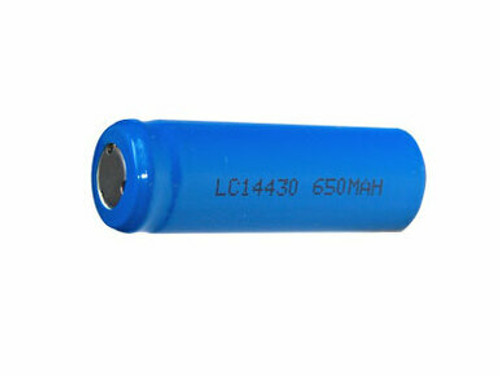
4/5 AA 3.7 Volt Lithium Ion 14430 Flat Top Battery (650 mAh)
$5.99As low as:- Buy in bulk and save
Bulk discount rates
Below are the available bulk discount rates for each individual item when you purchase a certain amount
- Buy 2 - 8 and pay only $5.99 each
- Buy 9 - 43 and pay only $5.29 each
- Buy 44 - 175 and pay only $5.09 each
- Buy 176 or above and pay only $5.09 each
-
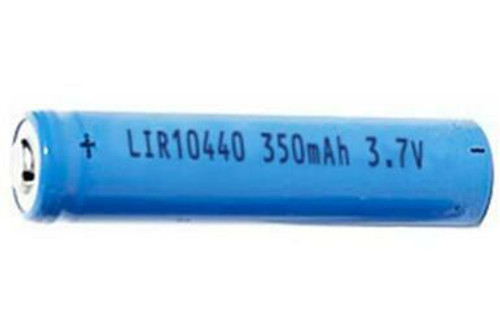
-

4/5 AA 3.7 Volt Lithium Ion 14430 Battery with Tabs (650 mAh)
$6.49As low as:- Buy in bulk and save
Bulk discount rates
Below are the available bulk discount rates for each individual item when you purchase a certain amount
- Buy 2 - 7 and pay only $6.49 each
- Buy 8 - 38 and pay only $5.99 each
- Buy 39 - 154 and pay only $5.79 each
- Buy 155 or above and pay only $5.79 each
-
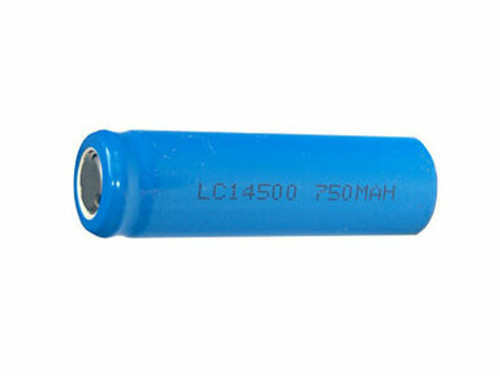
-

-
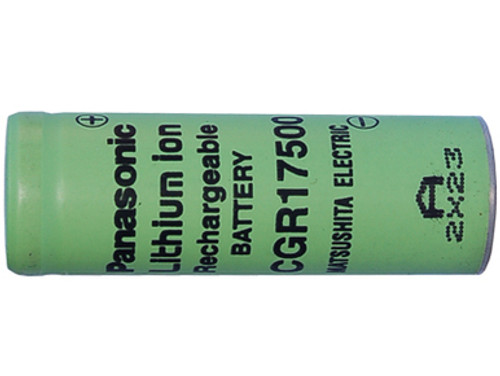
A 3.7 Volt Panasonic Lithium Ion CGR17500 Battery (830 mAh)
$7.99As low as:- Buy in bulk and save
Bulk discount rates
Below are the available bulk discount rates for each individual item when you purchase a certain amount
- Buy 2 - 6 and pay only $7.99 each
- Buy 7 - 31 and pay only $6.79 each
- Buy 32 or above and pay only $6.79 each
-

AA 3.7 Volt Lithium Ion 14500 Battery with Tabs (750 mAh)
$8.69As low as:- Buy in bulk and save
Bulk discount rates
Below are the available bulk discount rates for each individual item when you purchase a certain amount
- Buy 2 - 9 and pay only $8.69 each
- Buy 10 - 37 and pay only $7.99 each
- Buy 38 - 151 and pay only $7.19 each
- Buy 152 or above and pay only $5.79 each
-

-

-
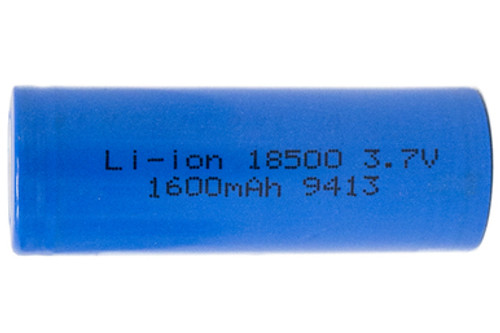
-

4/3 A 3.7 Volt Lithium Ion 18500 Battery with Tabs (1500 mAh)
$9.29As low as:- Buy in bulk and save
Bulk discount rates
Below are the available bulk discount rates for each individual item when you purchase a certain amount
- Buy 2 - 5 and pay only $9.29 each
- Buy 6 - 26 and pay only $8.79 each
- Buy 27 - 107 and pay only $8.39 each
- Buy 108 or above and pay only $8.39 each
-
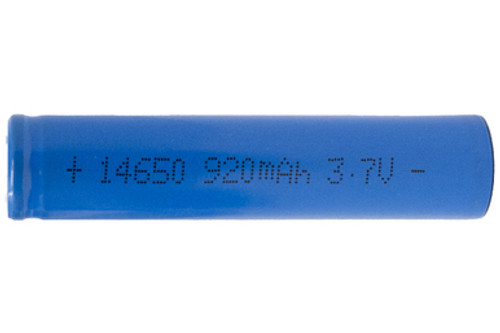
7/5 AA 3.7 Volt Lithium Ion 14650 Battery (920 mAh)
$9.89As low as:- Buy in bulk and save
Bulk discount rates
Below are the available bulk discount rates for each individual item when you purchase a certain amount
- Buy 2 - 8 and pay only $9.89 each
- Buy 9 - 57 and pay only $8.09 each
- Buy 58 or above and pay only $8.09 each
-
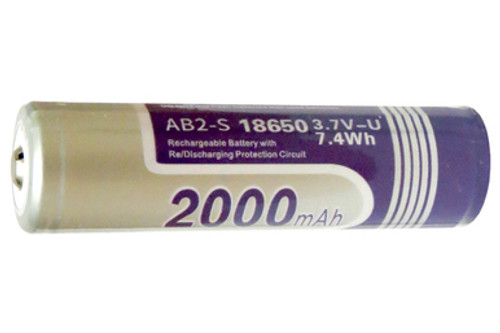
18650 3.6 Volt 2000 mAh Li-Ion Battery - Protected (Button Top)
$10.49As low as:- Buy in bulk and save
Bulk discount rates
Below are the available bulk discount rates for each individual item when you purchase a certain amount
- Buy 2 - 7 and pay only $10.49 each
- Buy 8 - 14 and pay only $10.09 each
- Buy 15 - 38 and pay only $9.89 each
- Buy 39 - 95 and pay only $9.59 each
- Buy 96 - 238 and pay only $9.19 each
- Buy 239 or above and pay only $9.19 each
-

3.7 Volt 18350 Li-Ion Button Top Battery (1200 mAh)
$11.69As low as:- Buy in bulk and save
Bulk discount rates
Below are the available bulk discount rates for each individual item when you purchase a certain amount
- Buy 2 - 6 and pay only $11.69 each
- Buy 7 - 42 and pay only $10.89 each
- Buy 43 or above and pay only $10.89 each
-

3.7 Volt Lithium Ion 18650 Battery with Tabs (2200 mAh)
$11.69As low as:- Buy in bulk and save
Bulk discount rates
Below are the available bulk discount rates for each individual item when you purchase a certain amount
- Buy 2 - 6 and pay only $11.69 each
- Buy 7 - 12 and pay only $11.19 each
- Buy 13 - 34 and pay only $10.99 each
- Buy 35 - 85 and pay only $10.69 each
- Buy 86 - 213 and pay only $10.29 each
- Buy 214 or above and pay only $10.29 each
-

3.7 Volt RCR123A (16340) Lithium Ion Battery (700 mAh)
$11.69As low as:- Buy in bulk and save
Bulk discount rates
Below are the available bulk discount rates for each individual item when you purchase a certain amount
- Buy 2 - 5 and pay only $11.69 each
- Buy 6 - 11 and pay only $9.89 each
- Buy 12 - 23 and pay only $8.99 each
- Buy 24 or above and pay only $8.99 each
-

-
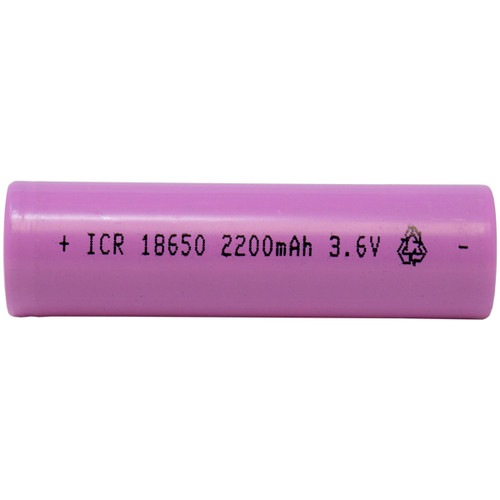
18650 3.7 Volt Lithium Ion Battery (2200 mAh)
$11.89As low as:- Buy in bulk and save
Bulk discount rates
Below are the available bulk discount rates for each individual item when you purchase a certain amount
- Buy 2 - 6 and pay only $11.89 each
- Buy 7 - 12 and pay only $11.39 each
- Buy 13 - 33 and pay only $11.19 each
- Buy 34 - 84 and pay only $10.89 each
- Buy 85 - 210 and pay only $10.49 each
- Buy 211 or above and pay only $10.49 each
-

18650 3.6 Volt 2600 mAh Li-Ion Battery - Protected (Button Top)
$11.99As low as:- Buy in bulk and save
Bulk discount rates
Below are the available bulk discount rates for each individual item when you purchase a certain amount
- Buy 2 - 6 and pay only $11.99 each
- Buy 7 - 12 and pay only $11.49 each
- Buy 13 - 33 and pay only $11.29 each
- Buy 34 - 83 and pay only $10.99 each
- Buy 84 - 208 and pay only $10.49 each
- Buy 209 or above and pay only $10.49 each
3.7 Volt Lithium-Ion Batteries: The Backbone of Modern Electronics
3.7 Volt Lithium-Ion batteries have become a cornerstone of modern technology, powering devices from smartphones and laptops to electric vehicles and portable tools. Their popularity stems from their high energy density, long cycle life, and excellent adaptability, making them indispensable for a wide range of applications.
What Are 3.7 Volt Lithium-Ion Batteries?
A Lithium-Ion battery operates using a cathode, an anode, and an electrolyte that work together to generate electrical energy. The 3.7 Volt nominal voltage is standard for many Lithium-Ion cells, providing the right balance of power and size for portable electronics.
These batteries are known for their:
High energy density: Storing more energy in a compact form compared to other rechargeable batteries like Nickel-Cadmium (NiCd) or Nickel-Metal Hydride (NiMH).
Lightweight and compact design: Making them ideal for portable and wearable devices.
Versatility: Available in various shapes, sizes, and capacities to suit different devices.
Key Advantages of 3.7 Volt Lithium-Ion Batteries
1. High Energy Density
Lithium-Ion batteries offer a much higher energy density than traditional rechargeable batteries. This means they can:
Power devices longer between charges.
Be used in compact applications without compromising energy storage.
Enable innovative designs for slim and lightweight electronics.
2. Long Cycle Life
One of the standout features of Lithium-Ion batteries is their ability to handle hundreds of charge and discharge cycles without significant capacity loss. This makes them:
Cost-effective in the long term.
Sustainable by reducing the need for frequent replacements.
3. Wide Temperature Range
Lithium-Ion batteries perform reliably in extreme conditions, with an operating range of -20°C to 60°C (-4°F to 140°F). This makes them ideal for:
Outdoor applications like solar panels and weather-monitoring devices.
Electric vehicles and drones, which often face variable temperatures.
4. Lightweight and Compact Size
The compact design of 3.7 Volt Lithium-Ion batteries allows manufacturers to:
Integrate them seamlessly into portable devices like smartphones, tablets, and wearables.
Design devices that are lightweight and easy to carry.
Applications of 3.7 Volt Lithium-Ion Batteries
1. Consumer Electronics
Lithium-Ion batteries power nearly all portable electronics, including:
Smartphones and Tablets: Providing long-lasting energy for daily use.
Laptops: Delivering efficient power for work, gaming, and multimedia.
Wearables: Compact batteries fit perfectly in smartwatches and fitness trackers.
2. Electric Vehicles (EVs)
In electric cars, scooters, and bicycles, Lithium-Ion batteries deliver:
High capacity for extended range.
Lightweight construction for improved energy efficiency.
3. Solar Energy Storage
Lithium-Ion batteries are used in solar panels and portable power banks to:
Store energy for later use.
Provide backup power during outages.
4. Power Tools
Cordless tools like drills, saws, and grinders depend on Lithium-Ion batteries for:
High performance without being tethered to a power source.
Long-lasting energy for extended projects.
Popular Brands of 3.7 Volt Lithium-Ion Batteries
Several trusted manufacturers produce high-quality 3.7 Volt Lithium-Ion batteries:
1. Samsung
Known for producing reliable and durable batteries.
Used in smartphones, laptops, and other electronics.
2. LG
Offers high-capacity Lithium-Ion batteries.
Commonly used in EVs and renewable energy applications.
3. Sony
Known for innovations in battery technology.
Supplies batteries for portable electronics and industrial devices.
4. Panasonic
Renowned for their long-lasting and efficient Lithium-Ion batteries.
Widely used in EVs and home energy storage systems.
Maintaining Your 3.7 Volt Lithium-Ion Batteries
Proper care and maintenance are essential to extend the lifespan and performance of Lithium-Ion batteries. Here are some tips:
1. Avoid Overcharging and Undercharging
Overcharging can lead to overheating and degrade the battery’s capacity.
Similarly, allowing the battery to fully deplete regularly can shorten its lifespan.
Tip: Use chargers designed for Lithium-Ion batteries and follow the manufacturer’s instructions.
2. Store Batteries Properly
Keep batteries in a cool, dry place, away from direct sunlight or heat sources.
Extreme temperatures can accelerate degradation or temporarily reduce performance.
Tip: Store batteries at a partial charge (around 40-60%) if they won’t be used for extended periods.
3. Use Regularly
Batteries perform better when used frequently. Long periods of inactivity can lead to self-discharge and capacity loss.
Tip: Charge and discharge the battery periodically to maintain optimal health.
4. Keep Contacts Clean
Dust and debris on the battery contacts can affect performance.
Tip: Gently clean the contacts with a dry cloth to ensure a solid connection.
Safety Considerations
Lithium-Ion batteries are generally safe when used properly, but they can pose risks if mishandled. Follow these safety tips:
Avoid Physical Damage: Do not puncture, crush, or drop the battery.
Use Compatible Chargers: Ensure your charger matches the battery’s voltage and current requirements.
Recycle Responsibly: Take old or damaged batteries to designated recycling centers to prevent environmental harm.
3.7 Volt Lithium-Ion batteries are a cornerstone of modern electronics, offering a blend of high energy density, long cycle life, and lightweight design. Whether you’re powering a smartphone, an electric vehicle, or a solar panel system, these batteries deliver exceptional performance across a wide range of applications.
To get the most out of your Lithium-Ion batteries, it’s important to choose a reputable brand like Samsung, LG, or Panasonic and follow proper maintenance practices. By avoiding overcharging, storing the battery correctly, and using it regularly, you can ensure it provides reliable power for years to come.
From portable devices to industrial applications, 3.7 Volt Lithium-Ion batteries are a versatile and durable solution that meets the demands of today’s energy-dependent world.





